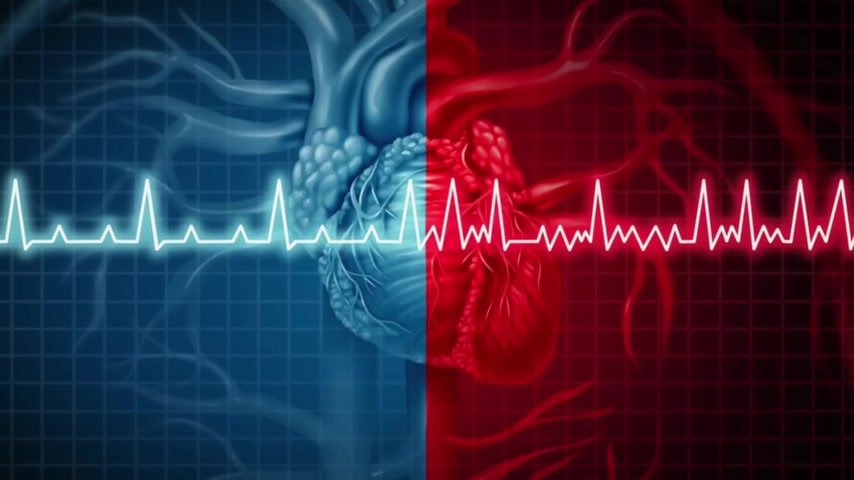Table of Contents
Uncover the hidden signs of magnesium deficiency. Learn the causes, symptoms, and effective treatments to boost your health. Discover how to naturally increase your magnesium levels today
The importance of magnesium for your health
Over 40% of the population is deficient in magnesium .
You’re about to find out that a magnesium deficiency can create huge problems for your health .
The dangers of magnesium deficiency
The influence of magnesium in your heart , if you’re deficient , you can end up with high blood pressure .
Magnesium has everything to do with the relaxation of arteries , muscles , smooth muscles .
So if you’re deficient in magnesium , you’re gonna have a little more calcium , and your arteries are gonna get rigid , and you’ll have a tendency to have high blood pressure .

Another common problem with the heart is arrhythmias .
The pacemaker of your heart is neurological , but it connects to the muscle .
And you actually have 4 pacemakers , which are little cells that have this rhythmic , beat into the heart , but that pacemaker is mostly dependent on the electrolyte magnesium .
And because magnesium is involved with nerve and muscle , you can end up with tetany or twitching or any type of abnormal relaxation or contraction of a muscle .
And this is why the number one cause of a leg cramp or a foot cramp is a magnesium deficiency .
Magnesium doesn’t just have to do with muscles , though , or nerves .
It’s involved in over 350 different , enzyme or biochemical pathways , some involving the production of energy .

That’s why the number one sign of a magnesium deficiency is fatigue .
Because if you don’t have magnesium , you can’t make energy .
You also have magnesium influence over insulin .
For example , if you are deficient , you are way more at risk of getting diabetes and developing insulin resistance .
And so if you have insulin resistance or you’re prediabetic or a diabetic , you must make sure that you have enough magnesium to fix that .
Even your mood is influenced by magnesium .
People that were depressed are nearly always deficient in magnesium .
Another really good biomarker or indication that you’re low in magnesium is c reactive protein .
It’s an inflammatory biomarker , and without magnesium , it’s very , very difficult to get rid of inflammation .
And so there’s a big , magnesium immune system relationship .
Magnesium RDAs
The RDAs or the required amounts of , magnesium range anywhere between 300 to about , you know , 750 milligrams .
If a person has some type of degenerative chronic disorder or a heart problem or diabetes or high blood pressure , the need for magnesium goes way up .
And so if you’re just operating off of these smaller amounts , you’re gonna have a hard time fixing these problems .
I think there’s 2 ways that we are deficient in magnesium .
Number 1 , we lose a lot of magnesium when we process foods , when we refine foods .

And most people live on refined foods , especially children who don’t , consume enough magnesium .
So even though we’re overfed , we’re definitely undernourished .
The other big challenge with magnesium deficiencies is is identifying , magnesium deficiency or testing for a magnesium deficiency .
If you’re using the blood to measure magnesium , you will never find a deficiency .
I’m talking about 99% of all your magnesium is actually located inside the cell , not in the blood .
Out of all the total magnesium you have , only 1% of it is in the blood .
Causes of magnesium deficiency
So you really have to understand the input dietarily of magnesium as well as things that can deplete magnesium .
And if we take a look at chlorophyll , that’s the green stuff in plants .
And at the heart of chlorophyll , you have magnesium .
The chemistry of chlorophyll is very similar to your own blood , with one difference .
With blood , you have iron .
With chlorophyll , you have magnesium .

And with an average person , especially in America , only consuming 1 cup of vegetables per day , you can see the problem .
And that’s for adults .
I don’t know many children that consume any vegetables .
So we have this input , this dietary input that we need to focus on , but also other things can deplete you of magnesium .
The big one is sugar , and the second one is refined carbohydrates .
The more sugar , the more refined carbohydrates you eat , the more magnesium you need to metabolize or deal with those , calories .
If you have diarrhea , you lose a lot of magnesium .
If you’re on a diuretic , you will lose magnesium .
If you’re on an antibiotic , you can lose magnesium .
And when you drink alcohol , you lose magnesium .

And even as we age , we store less magnesium in certain tissues .
There’s also a really important connection between your ability to absorb vitamin d and magnesium .
Magnesium benefits
You’re also gonna have a hard time absorbing b vitamins without magnesium .
Magnesium is involved in certain transporters in certain things in your body .
So one reason why you might be b deficient or vitamin d deficient is you just don’t have enough magnesium in the diet .
Magnesium also is involved in helping you keep your cortisol stress on the low side .
This is why magnesium is important in sleeping .

Because you’re deficient in magnesium and you have all these muscle cramps and you’re stressed out , you’re not gonna get a good night sleep .
Ideally , you wanna get your magnesium from your food .
So that would be consuming a lot of , dark leafy green vegetables .
The best sources of magnesium
If you wanted to take a supplement , I’d recommend the following types of magnesium .
These are way more bioavailable than other sources .

And I’m talking about magnesium citrate , or magnesium lactate , or magnesium glycinate , or magnesium aspartate , or even magnesium gluconate .
So I think now you have a greater appreciation for magnesium .
key Points:
A deficiency in magnesium could put you at risk for certain health concerns, such as:
• High blood pressure
• Arrhythmias
• Tetany or twitching
• Leg or foot cramps
• Fatigue
• Diabetes
• Insulin resistance
• Depression
• Inflammation
- The RDAs for magnesium are 300 to 750 mg. But some people may need much higher amounts. It’s important to consume foods high in magnesium and avoid certain things that deplete magnesium.
- Foods rich in magnesium are the ones high in chlorophyll, which would be green vegetables. The top things that deplete magnesium are sugar and refined carbohydrates.
Other things that can lead to a magnesium deficiency include:
• Diarrhea
• Diuretics
• Antibiotics
• Alcohol consumption
• Age
For a magnesium supplement, you have a few different good options, including:
• Magnesium citrate
• Magnesium lactate
• Magnesium glycinate
• Magnesium aspartate
• Magnesium gluconate
Magnesium is important for the absorption of vitamin D and B vitamins. It also helps support healthy cortisol levels, which can reduce stress and help you sleep better.
DATA:
https://www.healthdirect.gov.au/magnesium-deficiency
https://www.medicalnewstoday.com/articles/322191
FAQ:
What are the symptoms of low magnesium in the body?
Experiencing low magnesium levels can manifest through a variety of symptoms due to its vital role in numerous bodily functions. Recognizable signs include:
- Muscle cramps and spasms, signaling involuntary muscle contractions.
- Mental confusion and cognitive difficulties, reflecting magnesium’s importance in nervous system health.
- Increased stress responses like irritability or anxiety.
- Persistent fatigue, a common reflection of diminished cellular energy production.
- Sleep disturbances, including insomnia, pointing to magnesium’s role in regulating neurotransmitters.
- Heart irregularities such as arrhythmias, hinting at cardiovascular implications.
- Nerve-related issues like numbness or tingling sensations.
- Gastrointestinal discomfort, manifesting as nausea or vomiting.
What are the diseases caused by magnesium deficiency?
Chronic deficiency in magnesium can be a contributing factor to several serious health conditions, emphasizing the importance of maintaining adequate magnesium levels:
- Heart Diseases: Magnesium’s pivotal role in heart health can influence conditions like heart attacks and arrhythmias.
- Osteoporosis: Vital for bone integrity, a deficiency may accelerate bone loss.
- Type 2 Diabetes: Magnesium assists in regulating glucose and insulin sensitivity.
- Hypertension: Adequate magnesium levels help in managing blood pressure.
- Migraines: Magnesium plays a role in neurotransmitter release and blood flow regulation.
- Asthma: It may help in relaxing bronchial muscles, affecting asthma severity.
How do you treat hypomagnesemia?
Addressing low magnesium levels, or hypomagnesemia, involves several strategies tailored to the severity of the deficiency:
- Oral Supplements: Mild cases often respond well to supplements like magnesium citrate, magnesium gluconate, and magnesium glycinate.
- Dietary Adjustments: Incorporating magnesium-rich foods like leafy greens, nuts, seeds, and whole grains into your diet.
- IV Magnesium: Severe deficiency might require intravenous administration in a medical setting.
Equally crucial is identifying and addressing any underlying causes that might contribute to the deficiency.
What vitamin causes magnesium deficiency?
No vitamin directly results in magnesium deficiency; however, the dynamics of certain nutrients can impact magnesium levels:
- Vitamin D: High doses of vitamin D can deplete magnesium as the body utilizes magnesium to activate vitamin D.
- Calcium: Excessive calcium intake may hinder magnesium absorption and retention, underscoring the need for balance between these minerals.
Optimizing the intake and balance of vitamin D and calcium with magnesium is crucial for maintaining healthy magnesium levels and overall well-being.
Understanding magnesium’s critical role and managing its levels can significantly affect one’s health and quality of life, highlighting the importance of balanced nutrition and awareness of potential deficiency signs.




